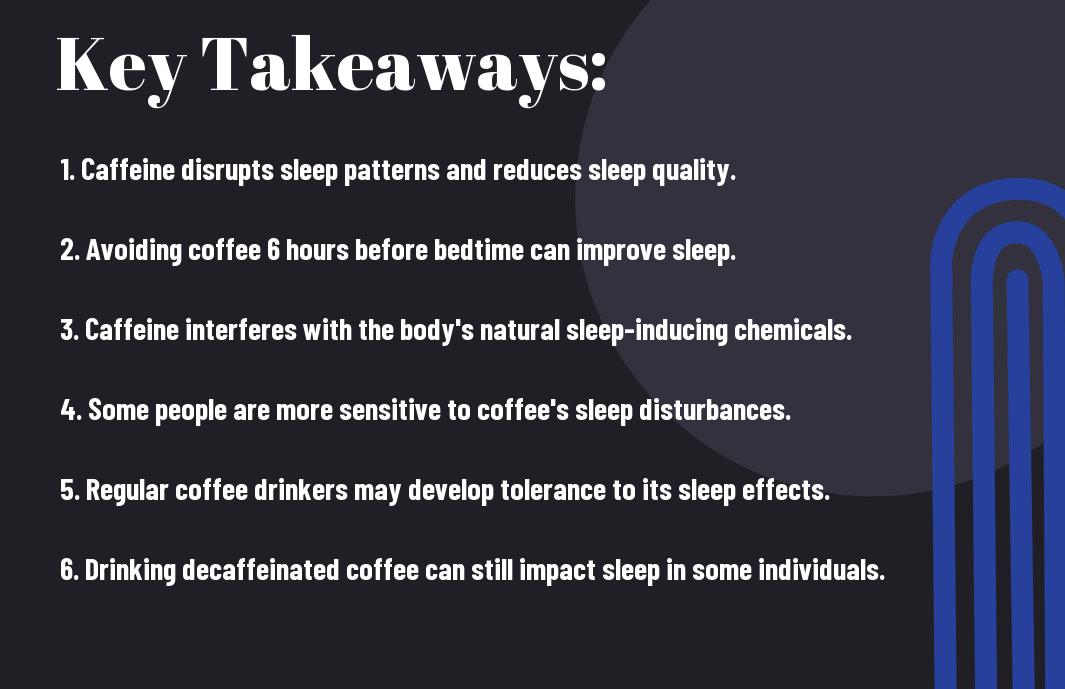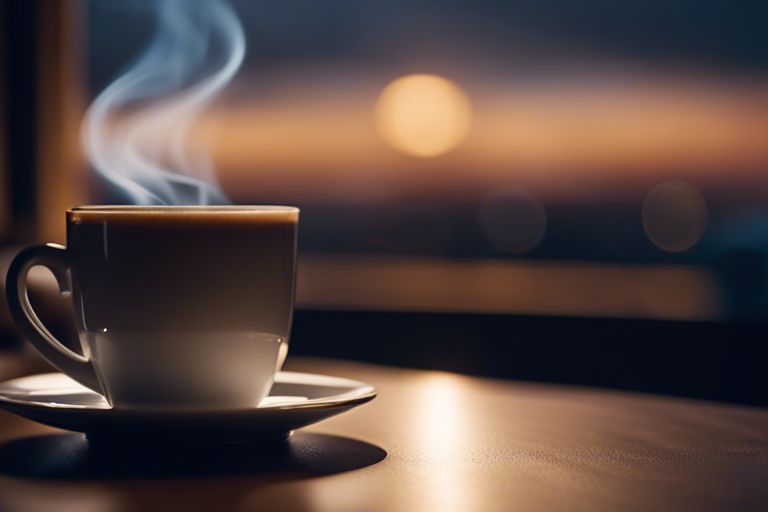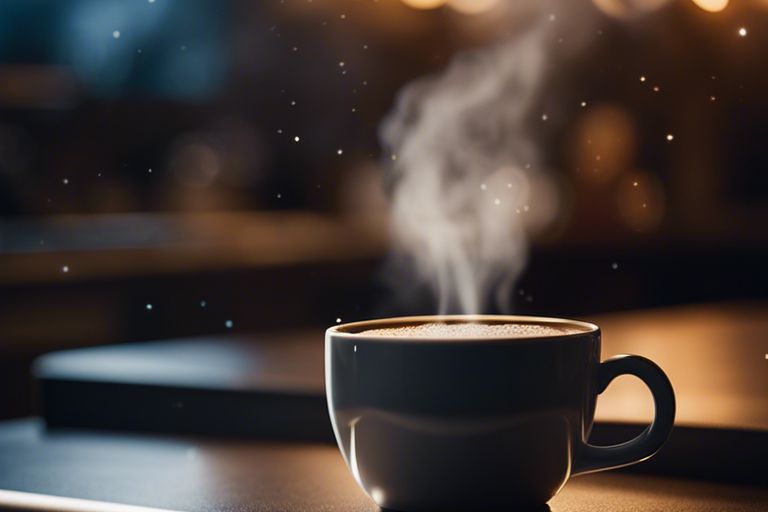Affect #Coffee on a good night’s sleep is a topic worth exploring. The relationship between your caffeine intake and the quality of your slumber is more intricate than you might think. Dive with us into the stimulating world of coffee and its effects on your precious ZZZs.
Key Takeaways:
- Caffeine Content: Coffee, due to its high caffeine content, can disrupt sleep patterns if consumed close to bedtime.
- Impact on Sleep Quality: Even consuming coffee earlier in the day can affect the quality of your sleep, leading to less restful and refreshing rest.
- Individual Sensitivity: People vary in their sensitivity to caffeine, so it’s important to know how your body reacts to coffee and adjust consumption accordingly.
- Time of Consumption: It is recommended to avoid coffee at least 6 hours before bedtime to minimize its impact on your sleep cycle.
- Alternative Options: Consider replacing caffeinated drinks like coffee with herbal teas or other non-caffeinated beverages in the evening to promote better sleep.

The Science of Sleep
Your sleep is regulated by a complex system of internal processes that help you drift off, stay asleep, and wake up feeling refreshed. Understanding this process can shed light on how coffee consumption can disrupt your sleep patterns.
What happens during sleep cycles
One of the key components of a good night’s sleep is navigating through different sleep cycles. These cycles consist of various stages, including light sleep, deep sleep, and REM (rapid eye movement) sleep, each playing a crucial role in restorative rest.
The role of melatonin and adenosine
With your body’s natural sleep-wake cycle, melatonin – known as the sleep hormone – rises in the evening to signal that it’s time to wind down and prepare for sleep. Adenosine, on the other hand, is a chemical that builds up in your brain while you’re awake, promoting sleep pressure and making you feel drowsy as the day progresses.
It’s important to note that both melatonin and adenosine can be influenced by external factors, such as caffeine consumption. Coffee, with its stimulating effects, can disrupt the production of melatonin and block adenosine receptors, making it harder for you to fall asleep and reducing the overall quality of your rest.
Caffeine’s Impact on Sleep
If you’ve ever had trouble falling asleep after enjoying a cup of coffee, you’re not alone. Caffeine, the primary stimulant found in coffee, has a significant impact on sleep. According to a study on The effect of caffeine on subsequent sleep: A systematic review and meta-analysis, consuming caffeine close to bedtime can disrupt sleep patterns and reduce total sleep duration. This is because caffeine blocks the effects of adenosine, a neurotransmitter responsible for promoting sleep.
How caffeine affects sleep patterns
To better understand how caffeine affects sleep patterns, it is vital to know that it can delay the onset of sleep, decrease deep sleep stages, and increase the frequency of nighttime awakenings. The stimulating effects of caffeine can make it harder to fall asleep and experience restful sleep, leading to feelings of grogginess and fatigue the next day.
The half-life of caffeine and its effects
The half-life of caffeine, which is the time it takes for the body to eliminate half of the caffeine consumed, plays a crucial role in its effects on sleep. On average, the half-life of caffeine is around 5 hours, meaning that if you have a cup of coffee containing 100 milligrams of caffeine at 4 p.m., around 50 milligrams of caffeine will still be in your system by 9 p.m. This lingering caffeine can interfere with your ability to fall asleep and stay asleep, disrupting your overall sleep quality.
The Timing of Coffee Consumption
Morning coffee: A wake-up call or sleep disruptor?
After a restful night’s sleep, many people reach for a cup of coffee first thing in the morning to kickstart their day. While coffee is commonly seen as a morning necessary that helps people wake up and feel more alert, it’s crucial to understand its impact on sleep. Consuming coffee in the morning can indeed provide a quick energy boost, thanks to the caffeine content, but it’s necessary to note that caffeine can linger in the body for hours, potentially disrupting your sleep if consumed too late in the day.
Afternoon coffee: A productivity boost or sleep saboteur?
The afternoon slump is a common phenomenon that prompts many individuals to reach for another cup of coffee to power through the rest of the day. However, indulging in a caffeine fix later in the day can have consequences for your sleep. The timing of afternoon coffee consumption becomes crucial, as drinking coffee too late in the day may interfere with your ability to fall asleep at night. It’s necessary to be mindful of the timing and quantity of coffee intake to ensure that it doesn’t sabotage your sleep quality.
The caffeine in coffee is a potent stimulant that can stay in your system for several hours. To prevent potential sleep disturbances, it’s advisable to limit your caffeine intake in the afternoon and evening to allow your body enough time to metabolize the caffeine before bedtime. Finding the right balance with your coffee consumption can help you stay productive during the day without compromising your quality of sleep at night.

Individual Variations in Caffeine Sensitivity
Keep in mind that individuals can have varying levels of sensitivity to caffeine, which can impact how it affects their sleep patterns. Some people can drink a cup of coffee right before bed and have no trouble falling asleep, while others may need to cut off their caffeine intake hours before bedtime to ensure a restful night’s sleep.
Genetic factors influencing caffeine metabolism
- Genetic variations in the CYP1A2 gene can affect how quickly or slowly a person metabolizes caffeine.
- Some individuals may be “fast metabolizers” who process caffeine quickly, while others are “slow metabolizers” who feel the effects of caffeine for a longer period.
Though genetics play a significant role in caffeine metabolism, other factors such as age, weight, and overall health can also influence how sensitive a person is to caffeine.
Age, weight, and other factors affecting caffeine sensitivity
- Younger individuals tend to be more sensitive to caffeine than older adults.
Assume that caffeine sensitivity decreases with age, as the body’s ability to metabolize caffeine may change over time. Weight can also play a role, as those with a lower body weight may feel the effects of caffeine more intensely than those who weigh more.
- Other factors that can affect caffeine sensitivity include hormone levels, medication use, and overall tolerance to caffeine.
This underscores the importance of understanding one’s own body and how it responds to caffeine intake, especially when it comes to ensuring a good night’s sleep.

Coffee’s Effects on Sleep Quality
Disrupted sleep stages and reduced sleep quality
All coffee drinkers can relate to the initial boost of energy and alertness that a cup of joe provides. However, what many may not realize is the potential impact of that caffeine fix on their sleep quality. Drinking coffee, especially in the afternoon or evening, can disrupt the natural sleep stages crucial for restorative rest. This disruption can lead to reduced sleep quality, leaving individuals feeling groggy and fatigued the next day.
Increased sleep fragmentation and daytime fatigue
With the consumption of coffee, individuals may experience increased sleep fragmentation, where their sleep is interrupted throughout the night. This can result in a shallower, less restful sleep, contributing to daytime fatigue and sluggishness. Even if one manages to fall asleep after drinking coffee, the quality of that sleep may be compromised, leading to a cycle of dependency on caffeine to combat daytime tiredness.
With ongoing coffee consumption, the potential for increased sleep fragmentation and daytime fatigue becomes more pronounced. This can create a vicious cycle where individuals rely on coffee for a perceived energy boost, inadvertently exacerbating their sleep troubles and perpetuating a cycle of poor sleep quality and reliance on caffeine.
Strategies for Coffee Lovers
Limiting coffee intake before bedtime
An effective strategy for coffee lovers to improve their sleep is by limiting coffee intake before bedtime. Drinking coffee close to bedtime can disrupt your sleep cycle by interfering with the secretion of melatonin, the hormone that regulates your sleep-wake cycle. To ensure a good night’s rest, it is recommended to avoid consuming any caffeinated beverages at least six hours before going to bed.
Avoiding caffeine in the afternoon and evening
Any coffee lover looking to enhance their sleep quality should consider avoiding caffeine consumption in the afternoon and evening. Cutting out caffeine later in the day can help prevent its stimulating effects from affecting your ability to fall asleep and stay asleep. Instead, opt for decaffeinated or half-caffeinated options to enjoy a warm beverage without worrying about its impact on your sleep.
The timing of caffeine consumption plays a crucial role in its influence on sleep. Even small amounts of caffeine consumed in the late afternoon or evening can lead to sleep disturbances, making it crucial to be mindful of your coffee consumption habits throughout the day.
Experimenting with decaf or half-caf options
The availability of decaffeinated and half-caffeinated coffee options provides coffee lovers with the opportunity to still enjoy their favorite beverage while minimizing the impact on their sleep. Switching to decaf or half-caf coffee can be a great way to reduce overall caffeine intake without sacrificing the enjoyment of a delicious cup of coffee.
It’s important to note that decaffeinated coffee still contains a small amount of caffeine, so individuals who are particularly sensitive to caffeine should monitor their intake to avoid any potential sleep disruptions. Experimenting with different coffee blends and brewing methods can help coffee lovers find a decaf or half-caf option that suits their taste preferences while promoting better sleep quality.
Final Words
Now that we have explored the impact of coffee on sleep, it is evident that caffeine can disrupt our sleep patterns if consumed too close to bedtime. Understanding how our bodies metabolize caffeine and being mindful of our intake can help us improve the quality of our sleep. So, next time you reach for that evening cup of coffee, consider opting for a decaffeinated version to ensure a restful night ahead.
FAQ
Q: How does coffee affect sleep?
A: Coffee affects sleep by blocking the effects of adenosine, a neurotransmitter responsible for making us feel sleepy. This stimulation can disrupt our natural sleep patterns and make it difficult to fall asleep.
Q: Does caffeine impact the quality of sleep?
A: Yes, caffeine can greatly impact the quality of sleep by reducing the amount of deep sleep we get and increasing the time it takes to fall asleep. This can lead to feeling less rested even after a full night’s sleep.
Q: How long does it take for caffeine to leave your system?
A: The effects of caffeine can last for hours, with half of the caffeine consumed taking about 5-6 hours to be eliminated from the body. It’s important to be mindful of when you consume caffeine to avoid disrupting your sleep.
Q: Can decaffeinated coffee still affect sleep?
A: Decaffeinated coffee contains some caffeine, although in much smaller amounts than regular coffee. Consuming decaf in the afternoon or evening can still impact your ability to fall asleep, especially if you are sensitive to caffeine.
Q: How can I enjoy coffee without it affecting my sleep?
A: To enjoy coffee without compromising your sleep, it’s best to consume it in moderation and avoid drinking it in the late afternoon or evening. You can also consider switching to decaffeinated coffee or alternative drinks to reduce your caffeine intake overall.
What are the origins of coffee





